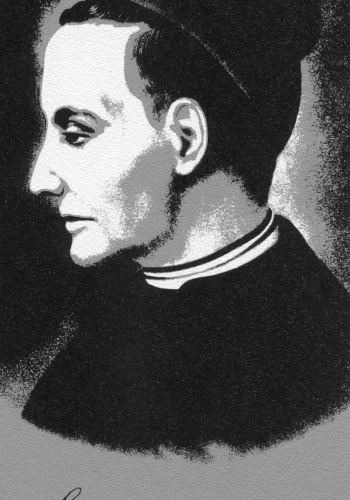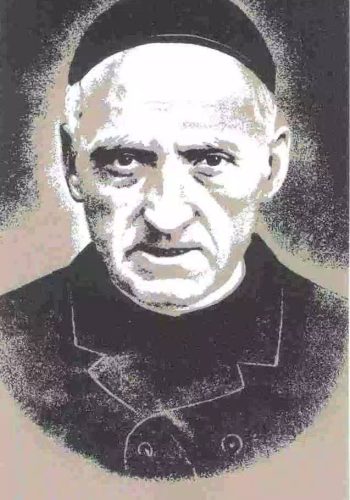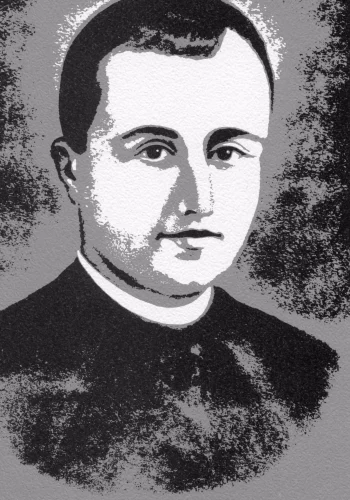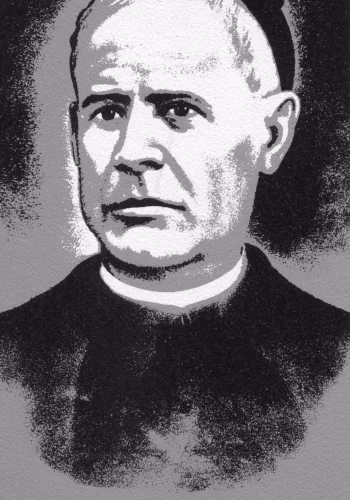Founders
Founders
The Congregation of Missionaries Sons of the Immaculate Heart of the Blessed Virgin Mary, also known as Claretian Missionaries was founded on July 16, 1849 in Vic, Spain by St. Anthony Mary Claret and five other young priests, Fr. Joseph Xifre, Fr. Stephen Sala, Fr. Dominic Fabregas, Fr. Manuel Vilaro, Fr. Jaime Clotet.


St. Anthony Mary Claret
Anthony John Adjutor Claret y Clara was born in Sallent (Barcelona) on December 23, 1807, in a family of a textile manufacturer. He is the fifth of eleven children. He was sent to Barcelona to study in view of their business. Despite some offers to set up his own factory, he refuses to satisfy his father’s wishes and he decides to give everything up to become a Carthusian. But he ended up entering the seminary of Vic and ordained as a Diocesan priest. Although he had not completed his theological studies, on June 13, 1835, he was ordained a priest because his bishop, Paul of Jesus Corcuera, saw something extraordinary in his personality. He went to Rome to offer his services directly to Propaganda Fide, then in charge of the task of evangelization in the whole world. While in Rome, he entered the Society of Jesus as a novice but after four months he was asked to leave and go back to Spain.
After going back to Catalonia, he dedicated himself to popular missions. For the sake of communion with the hierarchy and the pastoral faculties involved, he asks Propaganda Fide for the title of “Apostolic Missionary” which he fills with spiritual and apostolic content. He walks across much of Catalonia between 1843 and 1848, preaching the Word of God, always on foot, not collecting money or gifts for his ministry. It moves him to imitate Jesus Christ and the apostles. In 1848 he founds the Religious Library, a publishing house which in its first eighteen years launches 2,811,100 copies of books, 2,509,500 of small books and 4,249,200 leaflets. He founded the Confraternity of the Immaculate Heart of Mary and wrote the book “Daughters of the Blessed and Immaculate Heart of Mary”, which eventually inspired the foundation of the secular institute of Cordimarian Filiation. He was sent to the Canary Islands and was called “el Padrito”. He became so popular that he is co-patron of the diocese of Las Palmas along with the Virgen del Pino.
He founded the Congregation of the Missionary Sons of the Immaculate Heart of Mary on July 16, 1849, and a few days later he was appointed Archbishop of Santiago de Cuba and consecrated bishop on October 6, 1850, at the Cathedral of Vic. He was a missionary bishop. In six years, he visited his vast diocese three times. He feels concerned about the spiritual and pastoral renewal of the clergy and the founding of religious communities. Along with Antonia Maria Paris he founded the Religious of Mary Immaculate Claretian Missionary Sisters. He fought against slavery, created a farm school for poor children, set up a savings bank with a marked social character, founded Popular libraries, wrote two books on agriculture, etc.
Queen Isabel II personally chooses him as her Confessor in 1857 and therefore he must move to Madrid. In 1859 the Queen appointed him Protector of the church and hospital of Montserrat, Madrid, and Chairman of the monastery of El Escorial. His union with Jesus Christ reaches a peak in the grace of the sacramental species conservation, granted in La Granja (Segovia) on August 26,1861. Following the revolution of September 1868, he goes with the Queen into exile. In April 1869, he left the royal court and attended the Vatican Council I where he intervenes passionately in favor of papal infallibility.
Going back in France, due to the continuous persecutions, he was forced to flee as a criminal and take refuge in the Cistercian monastery of Fontfroide, near Narbonne. In this hidden monastery, surrounded by the love of the monks and some of his missionaries he dies, at 62 years and 10 months of age, on October 24, 1870.
His remains were moved to Vic in 1897. He was beatified by Pope Pius XI on February 25, 1934 and canonized by Pius XII on May 7, 1950.

Stephen Sala
Anthony John Adjutor Claret y Clara was born in Sallent (Barcelona) on December 23, 1807, in a family of a textile manufacturer. He is the fifth of eleven children. He was sent to Barcelona to study in view of their business. Despite some offers to set up his own factory, he refuses to satisfy his father’s wishes and he decides to give everything up to become a Carthusian. But he ended up entering the seminary of Vic and ordained as a Diocesan priest. Although he had not completed his theological studies, on June 13, 1835, he was ordained a priest because his bishop, Paul of Jesus Corcuera, saw something extraordinary in his personality. He went to Rome to offer his services directly to Propaganda Fide, then in charge of the task of evangelization in the whole world. While in Rome, he entered the Society of Jesus as a novice but after four months he was asked to leave and go back to Spain.
After going back to Catalonia, he dedicated himself to popular missions. For the sake of communion with the hierarchy and the pastoral faculties involved, he asks Propaganda Fide for the title of “Apostolic Missionary” which he fills with spiritual and apostolic content. He walks across much of Catalonia between 1843 and 1848, preaching the Word of God, always on foot, not collecting money or gifts for his ministry. It moves him to imitate Jesus Christ and the apostles. In 1848 he founds the Religious Library, a publishing house which in its first eighteen years launches 2,811,100 copies of books, 2,509,500 of small books and 4,249,200 leaflets. He founded the Confraternity of the Immaculate Heart of Mary and wrote the book “Daughters of the Blessed and Immaculate Heart of Mary”, which eventually inspired the foundation of the secular institute of Cordimarian Filiation. He was sent to the Canary Islands and was called “el Padrito”. He became so popular that he is co-patron of the diocese of Las Palmas along with the Virgen del Pino.
He founded the Congregation of the Missionary Sons of the Immaculate Heart of Mary on July 16, 1849, and a few days later he was appointed Archbishop of Santiago de Cuba and consecrated bishop on October 6, 1850, at the Cathedral of Vic. He was a missionary bishop. In six years, he visited his vast diocese three times. He feels concerned about the spiritual and pastoral renewal of the clergy and the founding of religious communities. Along with Antonia Maria Paris he founded the Religious of Mary Immaculate Claretian Missionary Sisters. He fought against slavery, created a farm school for poor children, set up a savings bank with a marked social character, founded Popular libraries, wrote two books on agriculture, etc.
Queen Isabel II personally chooses him as her Confessor in 1857 and therefore he must move to Madrid. In 1859 the Queen appointed him Protector of the church and hospital of Montserrat, Madrid, and Chairman of the monastery of El Escorial. His union with Jesus Christ reaches a peak in the grace of the sacramental species conservation, granted in La Granja (Segovia) on August 26,1861. Following the revolution of September 1868, he goes with the Queen into exile. In April 1869, he left the royal court and attended the Vatican Council I where he intervenes passionately in favor of papal infallibility.
Going back in France, due to the continuous persecutions, he was forced to flee as a criminal and take refuge in the Cistercian monastery of Fontfroide, near Narbonne. In this hidden monastery, surrounded by the love of the monks and some of his missionaries he dies, at 62 years and 10 months of age, on October 24, 1870.
His remains were moved to Vic in 1897. He was beatified by Pope Pius XI on February 25, 1934 and canonized by Pius XII on May 7, 1950.

Joseph Xifre
He was born in a farm in the neighbourhood of Vic (Barcelona) on 18 February 1817. In 1829 he started his ecclesiastical career in this same city. At that time it was not possible for anyone to be ordained priest in Spain because of the civil war situation. As a consequence, Joseph Xifré went to Rome in 1839 and lodged at the convent of Saint Basil. There he providentially met Fr. Claret who had gone there with the intention of joining the Propagation of the Faith. On 16 February 1840 he was ordained priest and returned to Spain. His apostolic spirit was very similar to Claret’s. From a very early stage he felt the desire to devote himself to preaching, leading a poor life and travelling by foot; for several years he followed this style of apostolate. Together with Fr. Claret, he founded the Congregation of Missionaries. He possessed a sharp talent and intelligence, was tall and slender, of dark complexion and bright eyes, quite a character. Beneath an austere appearance he concealed a big, magnanimous heart, imperturbable in dangers, an ardent entrepreneur. After the death of Fr. Stephen Sala, he was designated third Superior General on May 1st, 1858 and held this office until his death. While the Founder was still alive, Fr. Xifré always considered him as the Superior, and maintained with him continuous correspondence; it was he who ordered Fr. Claret to write his Autobiography. Exiled in France after the revolution, he accompanied Fr. Claret during the last days of his life in Fontfroide, gave him the last sacraments and received his religious profession. From then on, his entire life was a continuous dedication to the Congregation, making it grow to its greatest expansion up to the very day of his death, which occurred in 1899 in Cervera.

Manuel Vilaro
Was born in Vic (Barcelona) on 22 September 1816. He was short in stature but of pleasant bearing, kind, cheerful and modest. He was among the first to accompany Fr. Claret in his apostolic works. Because of his outstanding qualities, he was chosen for the foundation of the Congregation. It was that upon hearing Fr. Claret’s statement, “Today we start a great work,” with a humorous smile, retorted: “What can we do since we are so young and so few?” Claret answered, “You will see. If we are young and few, the more God’s power and mercy will shine.” Father Vilaró was also chosen to accompany Fr. Claret when the latter went to Santiago de Cuba as Archbishop. There he worked tirelessly preaching missions, retreats, and conferences but, a victim of his great zeal, he had to return to Vic in 1852. There, at the request of his family, he stayed in his house and not with the community; he did this perhaps in order not to distract the attention of the missionaries caring for him, since they were very few. But in his heart, he was always with them till his death which occurred a few months later. In his sickness, he was always attended by Fr. Clotet whose arms very likely he died. Due to the last events of his life, Fr. Xifré considered him excluded from the Congregation. The General Chapter of 1922 rehabilitated him and put him again on a level with the rest of the cofounders.
Fr. Claret writes in his Autobiography about Fr. Vilaró (n. 592): “I made him my secretary and he fulfilled this job very well. Besides acting as my secretary, he also preached and heard confessions frequently. He was well educated, virtuous, zealous, and a hard worker. He fell ill and because the doctors in Cuba could do nothing for him, they ordered him back to Spain, where he died in his hometown of Vic.”

Dominic Fabregas
Was born in Orís (Barcelona) on 10 July 1817. He was rather short, simple and timid, of a somewhat melancholic character, industrious, with a clear and penetrating voice that drew large audiences to his sermons. Like Xifré, and perhaps together with him, he also had to go to Rome and stay at the convent of St. Basil. There for the first time he had contact with the famous “Mosén” Claret, whom very likely he already knew, since he was only two years ahead of him in the seminary. He was ordained priest in Rome. Back in Spain, he devoted himself to the cure of souls until one day he was called by Msgr. Casadevall who invited him to get in touch with Mosén Claret. On 16 July 1849 he founded the Congregation together with Claret and the other companions. He was general counsellor of the Congregation. He was responsible for the foundation of the house of Segovia in 1861 and dedicated himself to preaching throughout the entire region. He was also tasked with the foundation of Huesca. After several appointments throughout Catalonia, already advanced in years, death caught up with him in Solsona in the year 1895.

Jaime Clotet
He was born in Manresa (Barcelona) on July 24, 1822. He studied philosophy and theology in Barcelona, then moved to Vic, studying morals. He went to Rome, where he was ordained to the priesthood. When he returned to Spain, he held various pastoral positions but soon realized that his vocation was not the care of souls. On the advice of Mr. Passarell, secretary of the bishop of Vic, he met with Father Claret, whom he only knew by hearsay. It was June 1849. He joined Fr. Claret in July to found the Congregation. He soon took charge of the first Brothers of the Congregation. In 1858, he was named Sub-Director General of the Congregation. In 1870, he accompanied Fr. Claret in Fontfroide during his last days, writing a summary of his life. In 1888 he ceased to be Sub-Director General and became Secretary. He wrote books on the catechesis of the deaf and dumb and promoted the Cause of the Beatification of Father Claret. In 1898 he died in the house of Gracia (Barcelona) with a reputation of sanctity. His cause of Beatification is introduced in Rome.
A brief portrait of a biographer: “loved and venerated by all, indefatigable forger of his own Christian and religious perfection; solicitous of the welfare of each one; who passed through the earth leaving behind him a soft perfume of holiness. He had no enemy whatsoever”.
